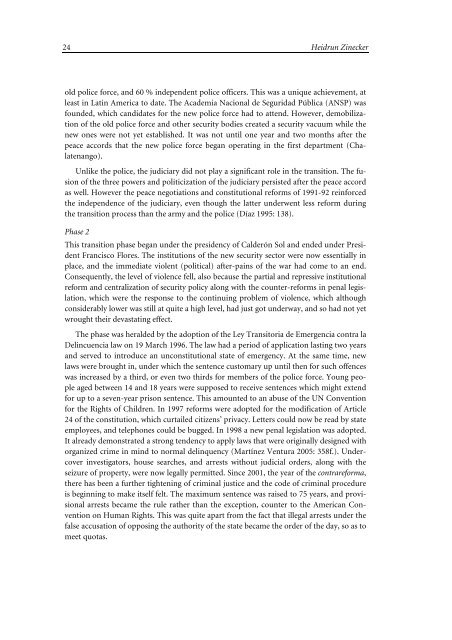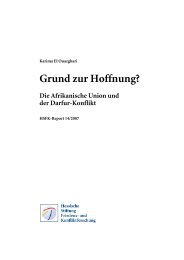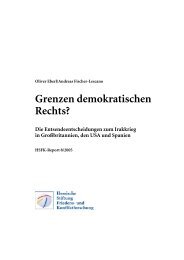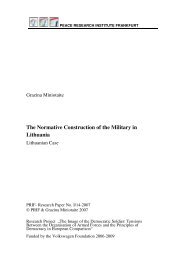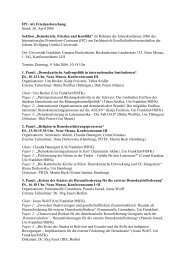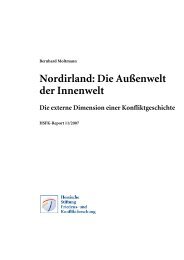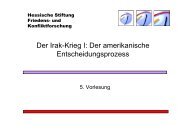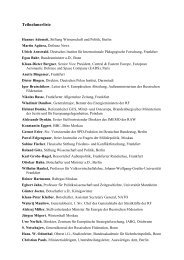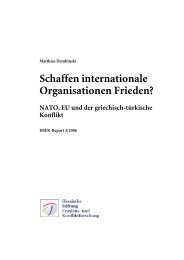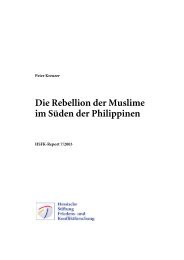From Exodus to Exitus Causes of post-war violence in El ... - eDoc
From Exodus to Exitus Causes of post-war violence in El ... - eDoc
From Exodus to Exitus Causes of post-war violence in El ... - eDoc
Create successful ePaper yourself
Turn your PDF publications into a flip-book with our unique Google optimized e-Paper software.
24 Heidrun Z<strong>in</strong>ecker<br />
old police force, and 60 % <strong>in</strong>dependent police <strong>of</strong>ficers. This was a unique achievement, at<br />
least <strong>in</strong> Lat<strong>in</strong> America <strong>to</strong> date. The Academia Nacional de Seguridad Pública (ANSP) was<br />
founded, which candidates for the new police force had <strong>to</strong> attend. However, demobilization<br />
<strong>of</strong> the old police force and other security bodies created a security vacuum while the<br />
new ones were not yet established. It was not until one year and two months after the<br />
peace accords that the new police force began operat<strong>in</strong>g <strong>in</strong> the first department (Chalatenango).<br />
Unlike the police, the judiciary did not play a significant role <strong>in</strong> the transition. The fusion<br />
<strong>of</strong> the three powers and politicization <strong>of</strong> the judiciary persisted after the peace accord<br />
as well. However the peace negotiations and constitutional reforms <strong>of</strong> 1991-92 re<strong>in</strong>forced<br />
the <strong>in</strong>dependence <strong>of</strong> the judiciary, even though the latter underwent less reform dur<strong>in</strong>g<br />
the transition process than the army and the police (Díaz 1995: 138).<br />
Phase 2<br />
This transition phase began under the presidency <strong>of</strong> Calderón Sol and ended under President<br />
Francisco Flores. The <strong>in</strong>stitutions <strong>of</strong> the new security sec<strong>to</strong>r were now essentially <strong>in</strong><br />
place, and the immediate violent (political) after-pa<strong>in</strong>s <strong>of</strong> the <strong>war</strong> had come <strong>to</strong> an end.<br />
Consequently, the level <strong>of</strong> <strong>violence</strong> fell, also because the partial and repressive <strong>in</strong>stitutional<br />
reform and centralization <strong>of</strong> security policy along with the counter-reforms <strong>in</strong> penal legislation,<br />
which were the response <strong>to</strong> the cont<strong>in</strong>u<strong>in</strong>g problem <strong>of</strong> <strong>violence</strong>, which although<br />
considerably lower was still at quite a high level, had just got underway, and so had not yet<br />
wrought their devastat<strong>in</strong>g effect.<br />
The phase was heralded by the adoption <strong>of</strong> the Ley Transi<strong>to</strong>ria de Emergencia contra la<br />
Del<strong>in</strong>cuencia law on 19 March 1996. The law had a period <strong>of</strong> application last<strong>in</strong>g two years<br />
and served <strong>to</strong> <strong>in</strong>troduce an unconstitutional state <strong>of</strong> emergency. At the same time, new<br />
laws were brought <strong>in</strong>, under which the sentence cus<strong>to</strong>mary up until then for such <strong>of</strong>fences<br />
was <strong>in</strong>creased by a third, or even two thirds for members <strong>of</strong> the police force. Young people<br />
aged between 14 and 18 years were supposed <strong>to</strong> receive sentences which might extend<br />
for up <strong>to</strong> a seven-year prison sentence. This amounted <strong>to</strong> an abuse <strong>of</strong> the UN Convention<br />
for the Rights <strong>of</strong> Children. In 1997 reforms were adopted for the modification <strong>of</strong> Article<br />
24 <strong>of</strong> the constitution, which curtailed citizens’ privacy. Letters could now be read by state<br />
employees, and telephones could be bugged. In 1998 a new penal legislation was adopted.<br />
It already demonstrated a strong tendency <strong>to</strong> apply laws that were orig<strong>in</strong>ally designed with<br />
organized crime <strong>in</strong> m<strong>in</strong>d <strong>to</strong> normal del<strong>in</strong>quency (Martínez Ventura 2005: 358f.). Undercover<br />
<strong>in</strong>vestiga<strong>to</strong>rs, house searches, and arrests without judicial orders, along with the<br />
seizure <strong>of</strong> property, were now legally permitted. S<strong>in</strong>ce 2001, the year <strong>of</strong> the contrareforma,<br />
there has been a further tighten<strong>in</strong>g <strong>of</strong> crim<strong>in</strong>al justice and the code <strong>of</strong> crim<strong>in</strong>al procedure<br />
is beg<strong>in</strong>n<strong>in</strong>g <strong>to</strong> make itself felt. The maximum sentence was raised <strong>to</strong> 75 years, and provisional<br />
arrests became the rule rather than the exception, counter <strong>to</strong> the American Convention<br />
on Human Rights. This was quite apart from the fact that illegal arrests under the<br />
false accusation <strong>of</strong> oppos<strong>in</strong>g the authority <strong>of</strong> the state became the order <strong>of</strong> the day, so as <strong>to</strong><br />
meet quotas.


